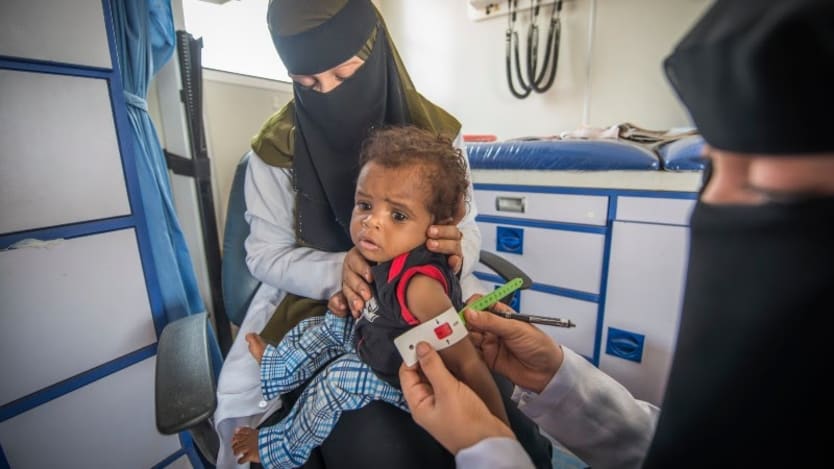
Since the conflict escalated in 2015, Yemen has become the world’s worst humanitarian crisis, with 24 million people in need of assistance. The rapid transmission of COVID-19 and renewed fighting have only aggravated the situation, taking humanitarian needs in Yemen to dizzying new heights.
UN appeal to address Yemen 'catastrophe' falls $1B short
During a virtual event in June, donors pledged $1.35 billion for the humanitarian response in Yemen — about half of the requested amount.
And just when more lifesaving assistance is needed, restrictions imposed by parties to the conflict and dwindling donor resources are all but choking the lifeline that humanitarian organizations offer to the most destitute Yemenis.
Four-fifths of the population need help to cope with the crippling effects of conflict, displacement, and disease. The war has left millions displaced and the health system in tatters. Millions of Yemenis currently depend on United Nations food assistance to survive, as food prices soar and the economy tanks. A severe hunger crisis is again on the horizon.
Obstacles to humanitarian assistance
Humanitarians working in Yemen are doing a heroic job, providing critical assistance under tremendous pressure. And yet the efforts of the humanitarian community to protect and help the most vulnerable people are often obstructed by fighting and deliberate impediments. Last year, access constraints at times deprived an estimated 8 million people in Yemen of some form of humanitarian assistance.
2019 saw an alarming surge in violence against aid workers and humanitarian assets, ranging from murder and assault to arbitrary arrests and theft. A coordinated media campaign in northern Yemen went so far as to incite hate speech and violence against aid organizations. Today, health professionals caring for coronavirus patients and scapegoated groups face threats and attacks.
Obstructing humanitarian assistance and attacking aid workers constitutes a breach of international humanitarian law. All parties to the conflict in Yemen must abide by their obligations under the law of war and lift the obstacles placed in the way of aid organizations. Civilians, critical civilian infrastructure, and humanitarian organizations must be protected and respected.
The EU Humanitarian Air Bridge
There is no time to waste. The Yemeni people need help and they need it now. The European Union and the broader international community cannot turn a blind eye.
On Thursday, the first plane landed in Yemen carrying humanitarian and medical supplies as part of an EU Humanitarian Air Bridge. Eleven further air bridge flights are to follow, transporting 220 tons of lifesaving aid from Europe and humanitarian hubs to Sanaa and Aden. In setting up this emergency lifeline to the most vulnerable Yemenis, the EU has heeded the call of the humanitarian community in Yemen. It is desperate to reinforce the emergency response to the coronavirus pandemic and the broader crisis that has engulfed the country.
The EU Humanitarian Air Bridge — a temporary solution fully funded by the EU and in coordination with member states — aims to respond to this pressing need by getting relief items for U.N. agencies, NGOs, and the International Red Cross and Red Crescent into Yemen. It complements tireless efforts by the U.N. to safeguard the humanitarian supply line in the context of coronavirus restrictions.
A pledging conference in June regrettably fell short of the $2.4 billion that the U.N. and its partners had asked for to provide essential assistance and protection to millions of people, including thousands of migrants stranded in Yemen and often stigmatized as “transmitters of disease.”
Matching its 2019 commitments, the EU has just increased its humanitarian aid for Yemen by another €70 million ($81 million), bringing the total humanitarian funding of the EU for Yemen to €115 million for 2020.
Ending the conflict
But humanitarian aid cannot substitute for a solution to the conflict that has ravaged Yemen for years. As a matter of immediate urgency, there needs to be a firm and unconditional cease-fire to avoid further loss of life and allow aid to reach people in need.
More than anything, after five years of relentless conflict, the guns need to fall silent. There has to be a renewed sense of urgency for finding a diplomatic way out of the war, for humanitarians to get the access they need to help, and for the people in Yemen to rebuild their lives. The EU, together with other members of the international community, continues reaching out to parties and stakeholders in support of U.N. efforts to put an end to the war and get the parties to the negotiating table.
Ultimately what is needed is a political solution. It is fundamental that all parties to the conflict answer the U.N. secretary-general’s call on those fighting to end hostilities.
This is urgent; this tragedy cannot go on. The people of Yemen have suffered enough.








